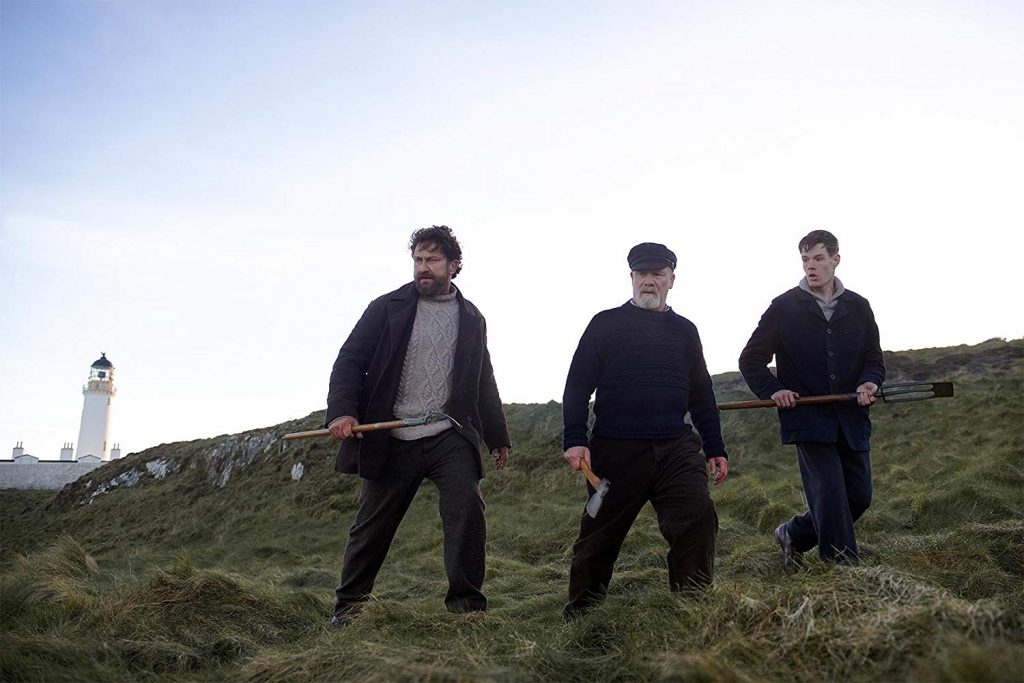A gray sky hangs over a port, where muted browns and ocean greens permeate the crowd. This somber atmosphere immediately sets the tone for “The Vanishing,” a sinister tale of the power of isolation and greed over men.
Nominated for best picture at the international Sitges Film Festival in Spain, the film was released in the U.S. in January and is now streaming on Amazon Prime. Director Kristoffer Nyholm presents a narrative based on true events, in which three experienced lighthouse keepers sailed in 1900 to one of the tiny, remote Flannan Isles of Scotland to assume a six-week post.
By the end of their shift, they were nowhere to be found. Since the bodies of the three men were never discovered, their true fate remains a mystery, but Nyholm’s film offers a story to fill and unsettle the viewer’s imagination.
In the film, Donald, James, and Thomas arrive on the island and begin to lead a quiet and hardworking life. They polish the enormous lighthouse lamp, they meticulously keep the daily record, and they brave harsh weather together. In a moment of relaxation after supper, Thomas plucks a fiddle, and James gently sings a folk song.
But tranquillity vanishes when Donald discovers a body near the shore, along with a small wooden chest. Thinking the man dead, the companions attempt to take the box, until the man awakes and begins to throttle Donald.
In self-defense, Donald kills his attacker, and before long, the men cannot resist the urge to open the box he so violently defended. Inside, they find several bars of solid gold. But what seems like a miracle turns out to be more like a curse, for their decision to hoard the gold sends them spiraling into murder and madness.
All three actors, headed by Gerard Butler as James and Peter Mullan as Thomas, convey the turmoil that ensnare the keepers. Donald (Connor Swindells) becomes pale and shaky, James’ eyes turn cold and ruthless, and in his gripping final monologue, Thomas’ face twists with agony.
Together, their performances drive home the warning that at no point in life — youth, middle age, or old age — is one immune to corruption.
That corruption comes through in jarring scenes that even a tough audience might find hard to stomach.
For instance, when two strangers come looking for their lost companion — and when it becomes apparent that the gold is what all of them actually desire — an exchange of brutal torture and murder ensues, and the life and death of the chest’s original owner is rapidly forgotten.
The level of violence approaches the unseemly, to the point where it almost glorifies the gore. But it certainly gets the point across that greed paired with isolation can erode every moral instinct.
Before long, the keepers begin to eye one another with suspicion. They struggle to stitch together moments of camaraderie, but they cannot recover any true sense of normalcy. It is here where the film’s deeper psychological and philosophical layers emerge.
Far from their families and from society, the men must rely on one another to maintain civility and integrity. So when all three of them covet the gold, giving into the folly of pursuing what led to another man’s demise, they all suffer the consequences.
In one moment, James attempts to take up the old folk song in a hoarse, out-of-tune voice, but Thomas refuses to play along with the fiddle. Silence and isolation have dominated their lives and their hearts, and as the film’s music fades, so does their mental stability.
With that transformation, the film’s title takes on a broader meaning. In other words, “The Vanishing” is not just a story about three men who disappeared. It is a demonstration of what happens when conscience breaks down and moral boundaries vanish.
A few simple scenes reinforce this central theme with artistic finesse. Near the beginning of the film, Thomas lights three candles one night, lets the light and shadow mingle for a moment, then blows them out. And as the keepers’ lives make clear, when faith, hope, and love are extinguished, so are peace, sanity, and even one’s very being.
Unfortunately, the film ends on a rather unsatisfying note, and the demise of the three men leaves us without much sympathy for them. Donald’s observation near the end of the film, “I wasn’t ready for this,” is a hard one to accept.
He speaks as if he or either of his companions had no choice in the unfolding of their fate. This victimization of the protagonists is probably the film’s weakest point. The keepers did have a choice and should have been ready to fight temptations, but they failed.
Had Nyholm crafted a more dramatic ending that offered a definitive pronouncement of moral rupture — rather than hint at shaky justifications — “The Vanishing” could have been quite stunning.
Still, the semi-flat finale does not rob the film’s ability to stand as a poignant illustration of the psychological effects of evil and of man’s weakness in the face of it.
This message might leave one feeling bleak by the end, but it could also point to a crucial truth: The precious nature of family and society, which serve to nurture the human heart, strengthen it against temptation, and preserve its sense of peace.
Sophia Buono is a writer living in Arlington, Virginia.
SPECIAL OFFER! 44 issues of Angelus for just $9.95! Get the finest in Catholic journalism with first-rate analysis of the events and trends shaping the Church and the world, plus the practical advice from the world’s best spiritual writers on prayer and Catholic living, along with great features about Catholic life in Los Angeles. Subscribe now!

